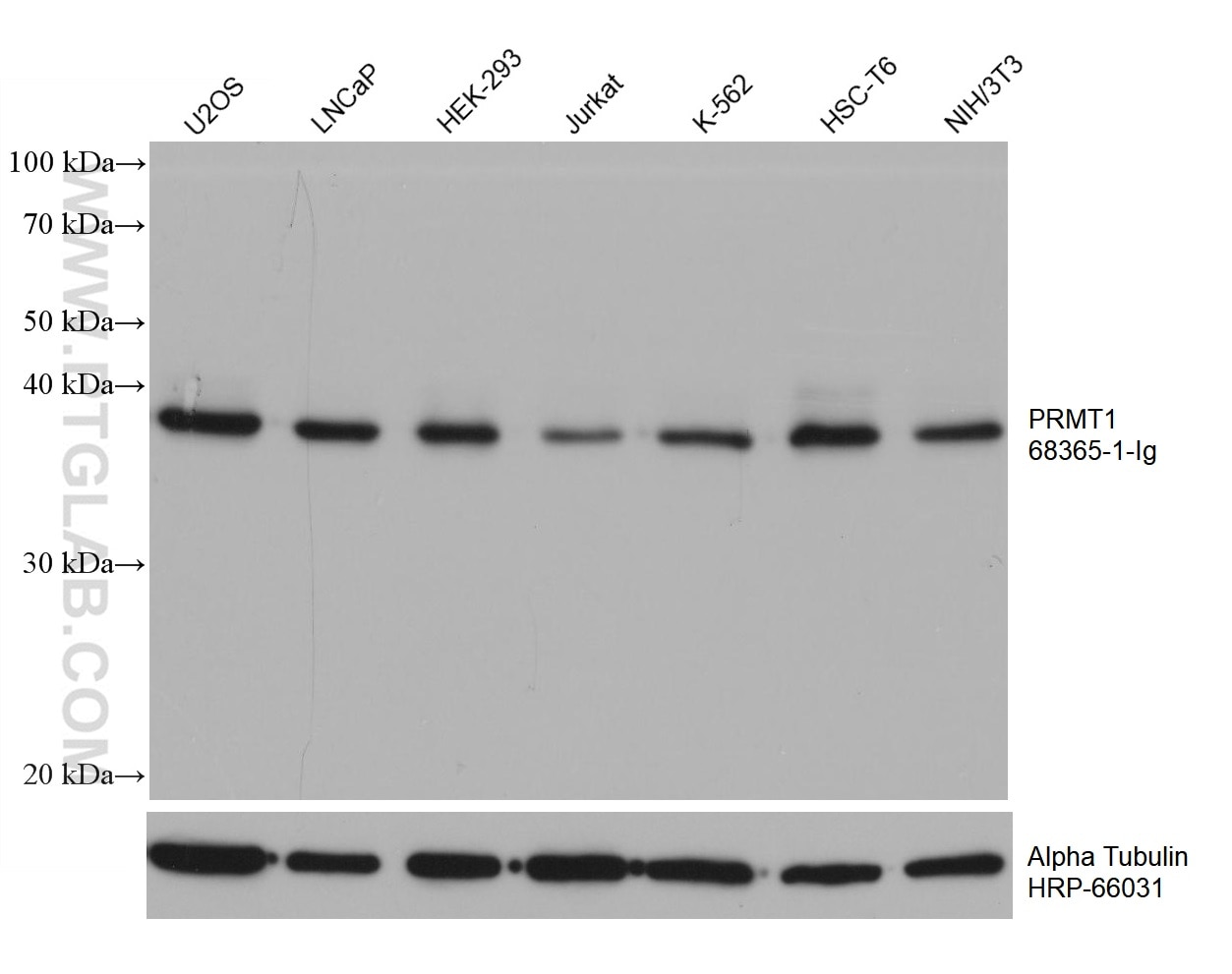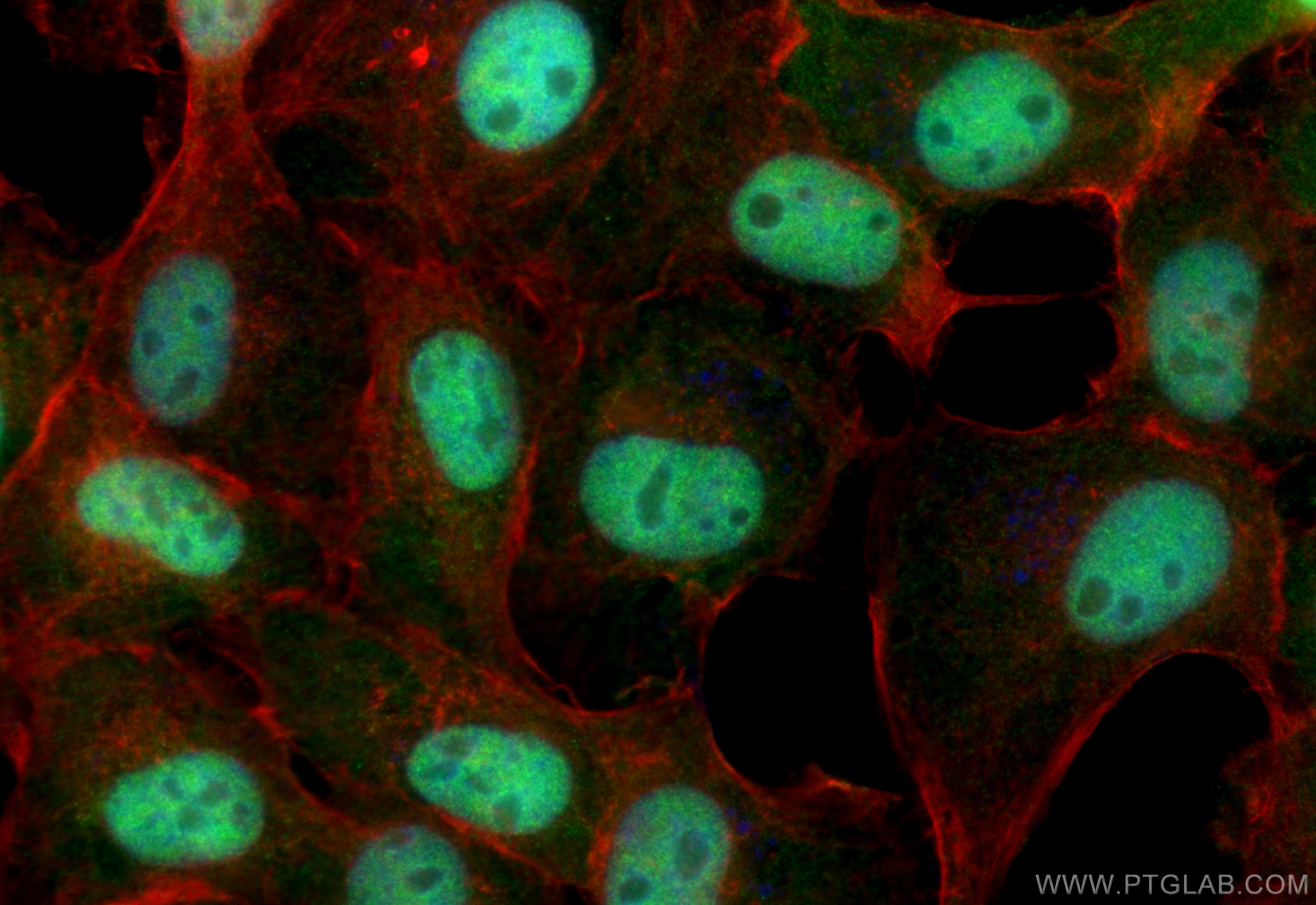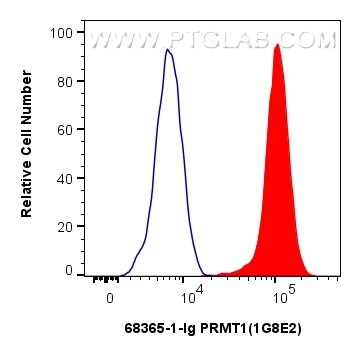Tested Applications
| Positive WB detected in | U2OS cells, LNCaP cells, HEK-293 cells, Jurkat cells, K-562 cells, HSC-T6 cells, NIH/3T3 cells |
| Positive IF/ICC detected in | A431 cells |
| Positive FC (Intra) detected in | HeLa cells |
Recommended dilution
| Application | Dilution |
|---|---|
| Western Blot (WB) | WB : 1:20000-1:100000 |
| Immunofluorescence (IF)/ICC | IF/ICC : 1:500-1:2000 |
| Flow Cytometry (FC) (INTRA) | FC (INTRA) : 0.80 ug per 10^6 cells in a 100 µl suspension |
| It is recommended that this reagent should be titrated in each testing system to obtain optimal results. | |
| Sample-dependent, Check data in validation data gallery. | |
Product Information
68365-1-Ig targets PRMT1 in WB, IF/ICC, FC (Intra), ELISA applications and shows reactivity with human, mouse, rat samples.
| Tested Reactivity | human, mouse, rat |
| Host / Isotype | Mouse / IgG1 |
| Class | Monoclonal |
| Type | Antibody |
| Immunogen |
CatNo: Ag29063 Product name: Recombinant human PRMT1 protein Source: e coli.-derived, PET28a Tag: 6*His Domain: 1-343 aa of BC019268 Sequence: MEVSCGQAESSEKPNAEDMTSKDYYFDSYAHFGIHEEMLKDEVRTLTYRNSMFHNRHLFKDKVVLDVGSGTGILCMFAAKAGARKVIGIECSSISDYAVKIVKANKLDHVVTIIKGKVEEVELPVEKVDIIISEWMGYCLFYESMLNTVLYARDKWLAPDGLIFPDRATLYVTAIEDRQYKDYKIHWWENVYGFDMSCIKDVAIKEPLVDVVDPKQLVTNACLIKEVDIYTVKVEDLTFTSPFCLQVKRNDYVHALVAYFNIEFTRCHKRTGFSTSPESPYTHWKQTVFYMEDYLTVKTGEEIFGTIGMRPNAKNNRDLDFTIDLDFKGQLCELSCSTDYRMR Predict reactive species |
| Full Name | protein arginine methyltransferase 1 |
| Calculated Molecular Weight | 42 kDa |
| Observed Molecular Weight | 38~42 kDa |
| GenBank Accession Number | BC019268 |
| Gene Symbol | PRMT1 |
| Gene ID (NCBI) | 3276 |
| RRID | AB_3085086 |
| Conjugate | Unconjugated |
| Form | Liquid |
| Purification Method | Protein G purification |
| UNIPROT ID | Q99873 |
| Storage Buffer | PBS with 0.02% sodium azide and 50% glycerol, pH 7.3. |
| Storage Conditions | Store at -20°C. Stable for one year after shipment. Aliquoting is unnecessary for -20oC storage. 20ul sizes contain 0.1% BSA. |
Background Information
PRMT1, the major protein arginine methyltransferase in mammals, catalyzes monomethylation and asymmetric dimethylation of arginine side chains in proteins. Human PRMT1 is encoded by the PRMT1 gene located on chromosome 19 (19q13.3) and composed of 12 exons and 11 introns. At the protein level, human PRMT1 shares a high degree of homology with the different members of the PRMT family that is conserved in eukaryotes. Phylogenetic studies based on the methyltransferase domain highlighted that PRMT1 is closely related to PRMT8.
Protocols
| Product Specific Protocols | |
|---|---|
| IF protocol for PRMT1 antibody 68365-1-Ig | Download protocol |
| WB protocol for PRMT1 antibody 68365-1-Ig | Download protocol |
| Standard Protocols | |
|---|---|
| Click here to view our Standard Protocols |








